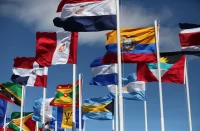A failing state
The decision by the so-called “Congress of the People of Cyrenaica” held near Benghazi to establish a unified federal region of Barq has again attracted the attention of the media to Libya.
Of course, the main reason for this decision by the Cyrenaicans was the desire to take charge of the two thirds of Libya’s oil resources located in their territory.

Especially after the new Constituent Assembly decided to give the eastern provinces only 60 of the 200 seats, and people from Zintan, Misrata and other regions in the western and central parts of the country got the key positions in the executive branch and the capital region.
However, Cyrenaica’s tribal associations were not the only ones dissatisfied.
In this context, we might recall the anti-government uprising in Bani Walid early this year, when armed units of the National Transitional Council (NTC) and the bureaucracy loyal to it were expelled from the city.
Moreover, just one day after the Congress of the People of Cyrenaica met, the administration of Libya’s third largest city — Misrata, whose standing in the country grew significantly as a result of a result of last year’s events — imposed restrictions on people from other regions entering the city.
In addition, a number of armed groups operating autonomously as “revolutionary detachments” are in control of entire regions of the capital city of Tripoli.
Thus, the attempt by the NTC as a whole and its leader Mustafa Abdul Jalil to remain “above the fray” in the conflict of interests involving all of the country’s tribes and clans can be considered a failure at this point.
Moreover, this policy of “equidistance” is increasingly arousing suspicions that the NTC is a typical comprador structure that serves the interests of the West. There is a reason why the NTC’s leader has come to be known as “Mustafa Abdul NATO” in Libyan society.
Apparently, the chief European lobbyist in the new Libyan government — France — is getting most of the attention.
The struggle for oil… and against Paris
Paris, of course, believes that it played a leading role in overthrowing Gadhafi’s regime and is therefore entitled to claim the “lion’s share” of Libya’s riches.
A widely published letter that a member of the NTC sent Qatari Emir Al Thani (in itself very revealing!) early last April provides confirmation of that. It said France would get 35% of Libyan crude in return for supporting the opposition forces.
Then there was France’s presidential election campaign, during which the country’s current leader, Nicolas Sarkozy, repeatedly mentioned the “strong contribution” of both French diplomacy and the French Air Force during last year’s events in Libya.
Of course, Libyan tribal leaders, particularly in oil-rich Cyrenaica, are irritated both by Paris’s ambitions and by the NTC’s behind-the-scenes games with it. The deaths of two French private security firm executives in Libya support that.
In addition, it is not surprising that the long-standing issue of the so-called “French debt,” which Seif al-Islam, the most talkative of Gadhafi’s sons spoke about last March, has just cropped up again.
On March 12, the Mediapart news agency posted a document which said Gadhafi had donated 50 million euros that had been successfully laundered through Swiss and Panamanian bank accounts to Sarkozy’s election campaign in 2007.
The fact that the negotiations for financing the campaign were set up by none other than Seif al-Islam and Ziad Takieddine, a controversial French businessman of Lebanese descent whom French law enforcement authorities have in their sights for his dubious role in the military-technical cooperation between France and Pakistan garnered a lot of attention.
There is obviously a well-planned anti-French campaign underway. Both Paris and Tripoli appear to understand that. That is evident from Jalil’s statement that foreign countries are responsible for inciting the current autonomist sentiment in the east and other parts of the country.
And although no country was named, it is quite clear which countries might benefit.
Qatar again?
Paris’s decision in recent years to invigorate its relations with African and Middle Eastern states by exploiting both personal ties and its favorite but as yet incomplete foreign policy “toy” — the Union for the Mediterranean — have produced a barely-concealed irritation among those who have the same kind of “Napoleonic plans” for the region.
The first country that comes to mind is France’s current “sworn friend,” Turkey, as well as, of course, that newly active regional player — Qatar.
Doha and Ankara have tolerated Paris’s activism in Africa for a long time. Particularly worthy of mention are decisions made at the Africa-France summit in Nice, during which the French paid special attention to the leading countries in non-Francophone Africa, primarily Sudan and Libya because of their hydrocarbon reserves (the former based on its potential and the latter based on its actual oil production).
The Emir of Qatar was not especially delighted that the French company Total has become the key “operator” of Southern Sudanese oil and has already announced its intention to triple the current level of oil production in Southern Sudan and expeditiously construct a pipeline to the Indian ocean through Kenya as an alternative to the Northern Sudan route (China plans to build an oil refinery in Kenya at a cost of about $1.5 billion).
Doha is also beginning to see the ground cut from under its feet in Libya.. The Libyan maritime and border security agreement signed by the defense ministers of Libya and France in Tripoli in late February is noteworthy in that respect.
Libya’s defense minister stressed that France would give Libya technical assistance in establishing effective border controls and, especially, defending against al-Qaeda militants inside the country (read Qatari mercenaries).
It appears that Doha is beginning to realize that the distraction of the Syrian campaign may cause it to lose Libya, where it invested so much effort and money last year. The increasingly frequent caustic comments that Al Jazeera is directing at Sarkozy and the NTC, as well as the growing separatist sentiments throughout Libyan territory and especially in the east, which is still in Qatar’s orbit, point to that.
There had been numerous examples of former allies who had a falling out out over how to divide up the spoils after reaching their goal. Therefore, if those who fought Gaddafi’s regime do not soon come to an agreement over spheres of influence in Libya we may witness a future “parade of sovereignties” in the former Jamahiriya that will turn the country into another Somalia.
_________________________
Vitaly Bilan holds a Candidate of Science (History) degree and is an expert on the Middle East.
Source: New Eastern Outlook














Pingback: La Cirenaica e la zuffa per i beni libici « Aurora